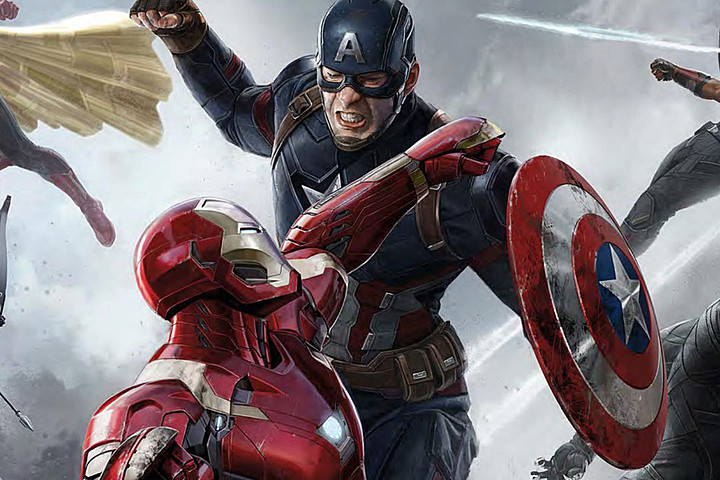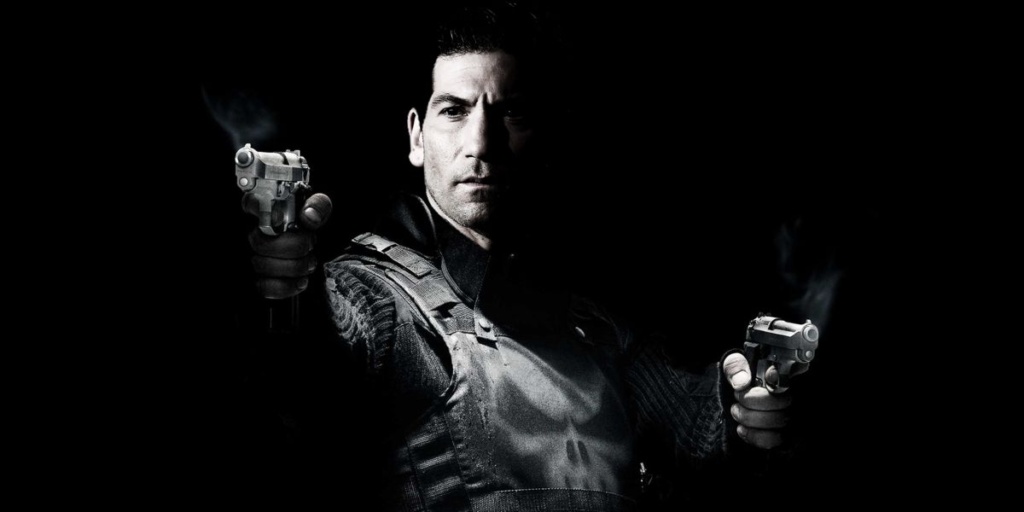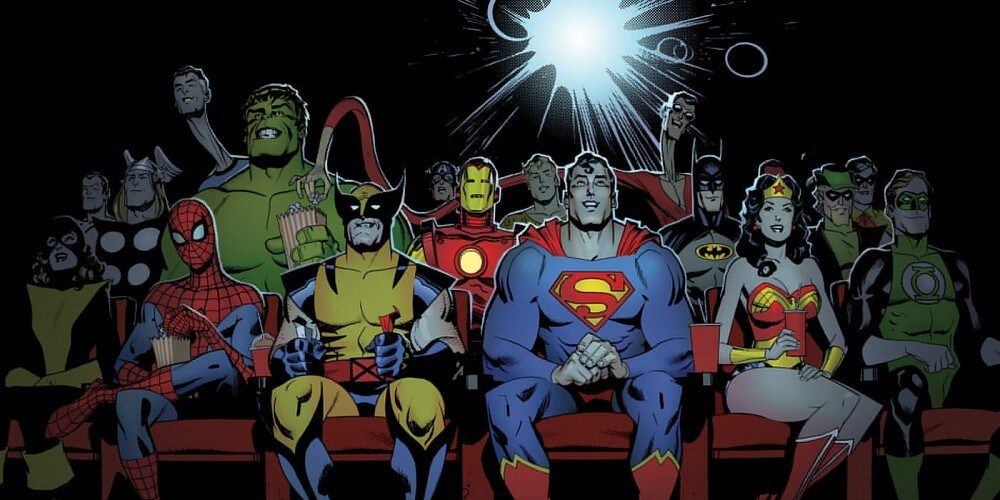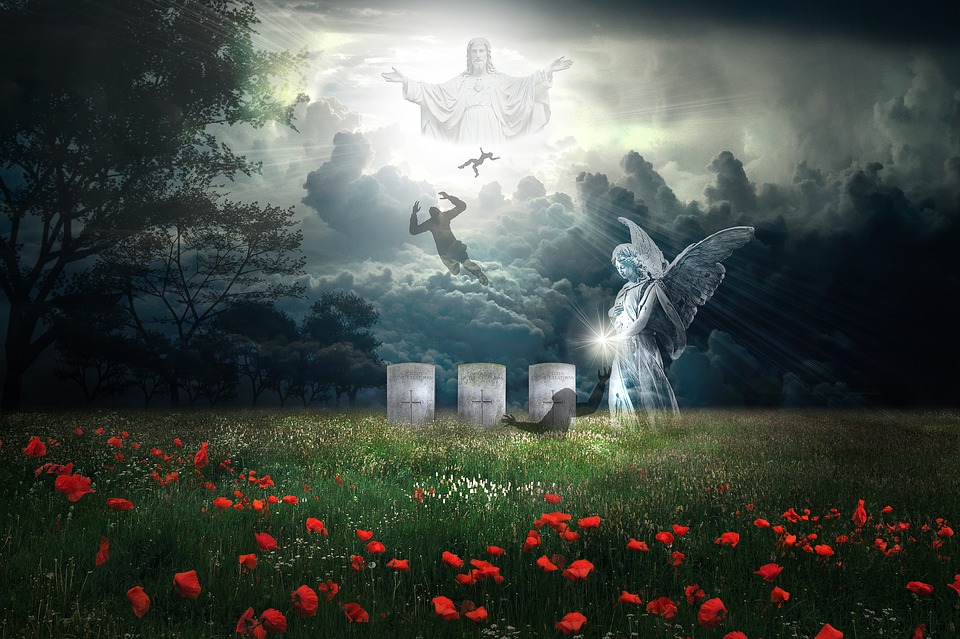So far, four major Hollywood films based on Marvel or DC properties have been released in 2016, with two more due before the year is up. The slate for 2017 is just as crowded, with yet another Wolverine movie, a sequel to Guardians of the Galaxy, yet another Spider-Man flick, a Wonder Woman reboot, yet another Thor film and no less than two big screen appearances by Batman – one in an all-star Avengers clone and the other in animated Lego form – all lined up for theatrical releases. And for 2018? Well, as an early count, we’ve got Black Panther, The Flash, the first Infinity War, Ant-Man 2, an animated Spider-Man movie, Aquaman and, according to Wikipedia, an expanded DC cinematic universe movie that doesn’t even have a script yet. And remember – that doesn’t even include all of the foreign-produced superhero films, the weird beard indie comic adaptations and all of those straight to Netflix animated movies coming out, too.
With movies like Civil War and Dawn of Justice – regardless of their inherent quality – making $1 billion at the international box office like it was nothing, it is pretty easy to see why so many movie studios are cranking out spandex-cinema like there is no tomorrow. Through the novel use of the shared-universe mechanic, each and every Marvel or DC film released – with the exception of the X-Movies – all tie together, providing a singular (and increasingly predictable) narrative that, alike a Big Mac, gives viewers an instantly familiar and nearly uniform product. The upside, of course, is that you know exactly what to expect heading into every film, so as a film consumer (or film producer), you know you are getting something reliable every time – be it in terms of thematic content or box office revenue. The downside, naturally, is that the films are becoming more and more formulaic, to the point it is getting hard to distinguish whether a slam-bang action sequence occurred in the last Captain America movie or the last Iron Man movie. With all of the movies featuring the same characters and continuing the same overarching plotline, each film feels less and less distinct, slowly turning what once were the ultimate annual event films into astonishingly uneventful commodities. The deluge of Avengers and Justice League crossovers, really, have more in common – conceptually and contextually – with Taco Bell value menu offerings than legitimate movies, right down to the pleasing, but most certainly unhealthy, cheesiness.
To be fair, the superhero trend has been chugging along at top speed for at least eight years now. Alas, all objects that seem like they are in perpetual motion must eventually slow down, and I still feel that global filmgoers will get tired of the commercialized formula much sooner than later. Sure, Deadpool and Ant-Man are entertaining products, but are they truly great films, the same way Burton’s Batman and the first two Superman movies were?
That’s the really weird thing I’ve noticed about the recent crop of superhero pictures – a glorious lack of core identity. Really, such is a premise-defeating miscue: shouldn’t superhero movies be the archetypical personality-driven movies?
The dual yen to tell a character-centric story and produce a high-concept, visual-effects laden, toy-selling action flick has traditionally been the Achilles’ heel of most super-pictures. To tell a great superhero story that remains great independent of the comic book melodrama – the clanking robots and exploding towers and Shakespearean monologue-spouting antagonists – is extraordinarily rare. The second Sam Raimi Spider-Man pulled it off. So did The Dark Knight. I’d even argue that 2012’s insanely underrated Dredd and 2014’s Kingsman managed the feat, too.
As evidenced by the bloated nature of Batman v. Superman and Civil War, however, the emphasis on “character” has all but been lost. Instead of allocating time for the protagonists to develop and showcase their pathos, scriptwriters are forced to cram as much sequel and spin-off set-up as they can into the pictures. “We’ll explain later,” these movies seem to scream, as yet another hulking CGI brute rips its away across a soundstage utopia, all while shiny men and women in NASA pajamas chase after them.

Is it just me, or are comic movies becoming less and less introspective? Remember, these are films based on a medium where you can actually read the inner-most thoughts of the characters – there’s supposed to be a particular Cartesian dualism bent built in to the genre. Yet with films like X-Men: Apocalypse, I’m just not getting that sense of idiosyncrasy. It’s just explosion, explosion, brooding, carefully timed wisecrack, explosion, sequel foreshadowing, cameo, explosion, more foreshadowing and then a hastily tacked on ending providing a false semblance of closure (offset, of course, by the inclusion of multiple post-end credits Easter eggs serving as segues to subsequent movies.) Completely eschewing the time-honored three-act narrative, the modern Marvel and DC movies represent one, contiguous middle – one with no palpable endgame in mind, besides the potentiality for yet another franchise reboot.
Perhaps that’s the fundamental flaw with superhero films as stories. When you look at all of the truly great cinematic classics – The Godfather and Intolerance and On the Waterfront and White Chicks – what’s their great common theme? Ultimately, it’s the same thing that makes all great art – from Paleolithic sculptures to Renaissance plays to modern day hip hop albums – well, great: an emphasis not on the characters’ (and oftentimes, creators’) strengths, but their human weaknesses.
The best music and literature and especially cinema aren’t odes to one’s finest attributes. Rather, they are paeans to guilt, remorse, helplessness, fear and doubt. They don’t celebrate the things that build us up, they tremble in horror at the things that break us down. They remind us of our own insignificance as inhabitants in a world of seven billion people and force us to confront the inevitability of our own mortality – and the unthinkable suggestion that we just might meet our fates a lot sooner than we’d like. Great art accepts – not embraces – the fact that we are frail, feeble, shortsighted, and undependable. It is the contradictorily beautiful realization of what we truly are as a species – warts and all.
And if there is one thing superhero movies AREN’T about, its powerlessness. Indeed, pretty much all of them are megalomaniacal fantasies, these egotistical odes to our longings for invulnerability and omnipotence. They appeal to our illusions of grandeur and our narcissism and in the case of some of the more egregiously violent ones – The Crow, The Punisher, and Kick-Ass – our cruel appetites for “frontier justice.” Just how long can we watch invincible action figures laugh in the face of computer-generated death before we hanker for something a tad more humanistic?

The bubble has to burst sooner or later. There are only so many ways to retell the same old story about god-men – empowered by some freak miracle of modern science or the deus ex machina of speculative technology – doing battle with angst-ridden multibillionaire industrialists and barbarian alien warriors (signifying the First World’s fear of the Third World, perhaps?) before it becomes too predictable for audiences to take seriously. Superhero movies are the celluloid equivalent of Ben & Jerry’s ice cream; sure you, enjoying gorging on it from time-to-time, but eating it for every meal? Sorry, but we all need something more substantive, whether we are talking about fat-derived calories or box office offerings.
When there’s a mega-huge-super-duper-all-star cross-over superhero Armageddon-porntwo and a half hour long extravaganza coming out every six months and hyper-obscure characters like The Inhumans are garnering feature length films, you know the end is nigh. Yes, we are all gaga about Batman and Spider-Man now, but the market is slowly but surely ascending to the point of critical oversaturation. The mock heroics and power fantasies can only maintain their allure for so long, and eventually, the masses are going to want something that instead speaks to the humanity in all of us.
Will the movie-going throng still be enamored by Batman v. Superman IV: Here Comes the Hemo-Goblin or The Avengers Part 7: Beware Devos the Devastator? Everything runs its course, all fads eventually tire out and inevitably, people get sick and tired of the same-old, same-old being shoved down their throats.
And that’s the one thing Hollywood’s Superhero-Industrial Complex isn’t immune to – our-totally-not-at-all super natural tendency to want something fresh and meaningful from our popular culture tastemakers. And to reiterate the all-too-prescient words of the CGI antagonist from a certain 2004 film.
“When every movie is super, no movie is.”






Comments 1